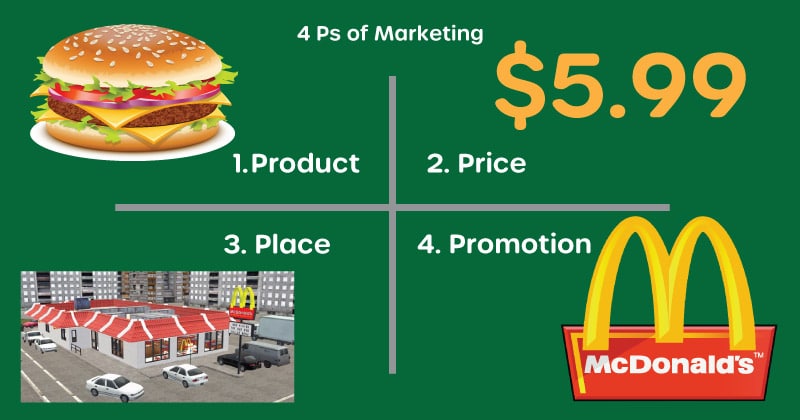The four principles of marketing strategy are specialization, differentiation, segmentation and concentration. These marketing principles come from Brian Tracy’s Total Business Mastery Seminar and combine to form a marketing strategy that works like this.
- Clearly identify where you will specialize in terms of the products or services offered.
- Differentiate your brand and/or product from competitors to achieve a competitive advantage.
- Segment your potential customer base into groups that you can market to more individually.
- Concentrate your promotional campaign on your best prospective customers.
Let’s further explore and unpack these principles for an effective marketing strategy. We’ll also look at the four Ps of marketing: product, price, place and promotion. These are controllable factors as opposed to an integrated set of marketing principles that can be used to guide your strategy.
1. Specialize in the Product or Service

Specialization is part of every marketing strategy whether you’re especially aware of it or not. You can provide goods and services for a large or small consumer market. The smaller the target market, the higher your level of specialization.
Choose the right level of specialization
With more detailed specialization, the greater your prospects of outshining the competition. You can more easily deliver the best product or service in that category and tailor your marketing campaign accordingly. But the drawback is that you sacrifice sales and revenue by aiming small.
You need to find and focus on the market niche that best matches the strengths of the business operation. That should happen in product development initially. Once the form of the product or service is largely settled, you can direct marketing efforts towards brand development and promotion in your target market.
Companies become more or less specialized over time
It’s fairly common to see a high level of specialization early in the life of a company. That allows the business to gain a foothold and become a minor success at least. The platform created then allows an enterprise to diversify and broaden its range of products and services.
It’s always a balancing act, with some businesses having to retreat, and scale back on product diversification, when they encounter difficulties in new markets. Companies may also prune non-performing parts of their business and increase specialization that way.
Example: Specialist digital marketing services
A digital marketing agency, for example, has a large menu of services to potentially offer, including content marketing, search engine optimisation (SEO), search engine marketing (SEM), social media marketing, affiliate and influencer marketing, and email and message marketing (Source: Mallory). And there are many niches within each of these categories as well.
Every digital marketing agency has to make a choice about its level of specialization. Once that’s done, the agency can focus on optimizing quality and efficiency in the provision of the service (or services). The agency’s self-promotion can heavily target the audience for this well-defined specialist offering.
2. Differentiate the Product or Brand

The second principle of marketing strategy is differentiation of the product or brand. Differentiation is really the key to business. It may have been a marketer who said this but it’s been claimed that all business strategy is differentiation strategy. To hold any sort of competitive advantage in the marketplace, you must distinguish what you are or offer from what else is available to customers.
Differentiation is a marketing strategy in which your brand identifies the one thing that makes it genuinely different from competitors and then leverages that notion in its branding and messaging to effectively attract ideal customers.
Herosmyth
You can figure out how to differentiate your brand by looking within to determine what is the unique selling point that your business offers. Without some of kind of uniqueness, there’s always a risk that you’ll simply be bypassed in the marketplace and attract insufficient market share to sustain the enterprise.
If you can find this defining feature of individuality, it’s possible to do it so well that you can build a powerful brand over time and deter potential competitors from copying what you do.
3. Segment the Customer Group

Segmentation means looking at your market and saying, “Who are the specific customers in the market who value my area of differentiation and who will pay more for my area of specialization than anybody else?” Segmentation is segmenting and identifying those customers who are most likely to buy from you the fastest.
Businesses cannot personalize marketing campaigns for each customer. Instead, marketers group their customers into segments. Customer segmentation allows businesses to prioritize and engage with their most important customers through marketing differentiation.
Adam Uzialko
While every person is unique, grouping is essential in marketing. It’s inefficient to try to target everyone at once. Segmenting allows for nuance by dividing potential customers into groups. Here, it’s important to group prospective customers by characteristics that are linked to differences in buying patterns. Defining the typical customer within each group can be part of this principle of marketing strategy.
4. Concentrate Your Marketing Efforts

And the final marketing principle is concentration. Once you’ve determined your very best market segment for what you do really well, focus all your marketing energies on them. Adjust the marketing mix to get the highest return on investment (ROI).
Segmentation combined with concentration allows you to grow a business with limited production capacity and a small marketing budget. You can start by targeting the most likely and best customers for your uniquely differentiated product.
McDonalds restaurants example
McDonalds customers are people who want to eat quickly and they want cleanliness, efficiency, value and pleasant surroundings.
So what the company will do is offer every product they possibly can for people who want to eat quickly; whether it’s a salad, a shake, or a type of coffee. They’re constantly looking for other products that can be offered to the customer in that market segment; to the person who wants to eat quickly and efficiently from a franchise they trust.
Video Presentation from Brian Tracy
This is a video from Brian Tracy’s Total Business Mastery seminar. Here, he presents the 4 Principles of Marketing Strategy. The video answers key questions about your marketing mix, including: How do I bring in customers? How do I determine the target markets? What exactly is my competitive advantage?
Here are some excerpts from Brian’s presentation.
Competitive advantage is “How it is that you are different and better than your competitors?” Because human beings in the marketplace, customers, always want to know, “Why should I buy from you rather than from someone else?”
And you’d better give me a better reason than your competitor does or I’ll buy from your competitor and it’s not personal. It’s just I want to get the very best deal as a customer.
I want to get the highest quality for the lowest price. You tell me why I should buy from you? Why you are giving me the highest quality, the lowest price? If your answer is better than that of your competitors, I’ll buy from you. And if it’s not, I won’t and it’s not personal… no emotion involved.
4 Ps of Marketing: Marketing is More Than Advertising

The 4 Ps of marketing – product, price, place, promotion – form the marketing mix concept. This set of marketing areas is a reminder that there’s much more to good marketing than just promoting or advertising what you have. Marketing is a fundamental business function and the marketing mix begins with the product.
- Product: Marketing starts with a clearly defined product or service. What exactly is it that you’re selling and what need does it satisfy for your customers? Knowing the product and designing to be the best that it can be is a starting point for effective marketing.
- Price: Pricing strategy can also be an important element of marketing. Maximizing profit is about finding a price that comfortably covers your costs while also resulting in high sales volumes. Are you targeting the low (discount) end of the customer base or premium (prestige) potential customers? Several or more pricing strategies are available apart from simply discounting (refer: ProfitWell).
- Place: Where can you sell your product that provides the best competitive advantage and most profit? The place part of the four Ps could be about targeting a geographic location, a digital marketing platform, or a particular group of people. Marketers need to do market research to find the right home for their product or service.
- Promotion is about informing your target audience of the buying opportunity you’re offering. Advertising is one promotional activity; other examples are branding, generating publicity through social media, influencer sponsorships, and email outreach.
Compared to the four marketing strategy principles – specialization, differentiation, segmentation, concentration – the 4 Ps is just a reminder of how far marketing extends. The 4 Ps are concerned with the marketing mix and don’t represent a strategy as such.
By contrast, what the four marketing principles give us is a lens by which to zoom in on the key activities that will ultimately determine the success or otherwise of our marketing efforts. The four Ps tells us that marketing is a big job; the four marketing principles provide angles to design an intelligent strategy.

I now have a better understanding of the distinction between 4 Ps of marketing mix and 4 marketing principles.
We have a start-up and I am a part of the marketing team, and we have been doing a lot of promotion lately. These tips are very nice. They seem doable and make sense. As we all are graduates and have little to no experience in business, these tips are super helpful for us. Thanks for sharing. Appreciate it.
I have an amazing product that I am in the middle of working on and I am trying to have a marketing plan set and ready to go. This article has not only answered all my questions but gave me more ideas and concepts to ponder as well as changes to consider. Thanks!!